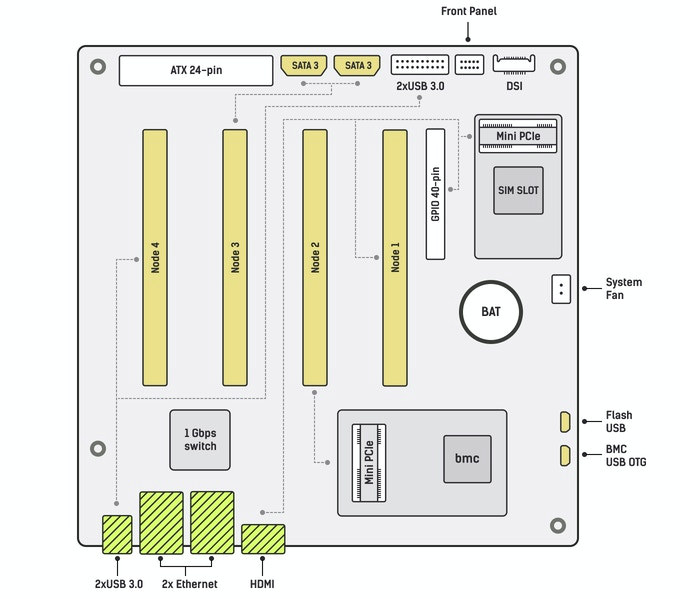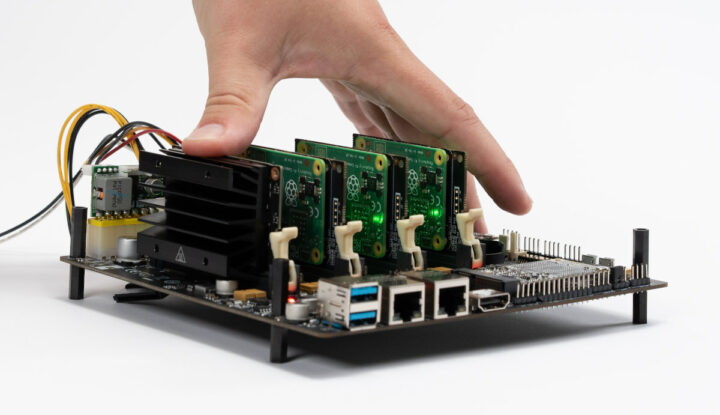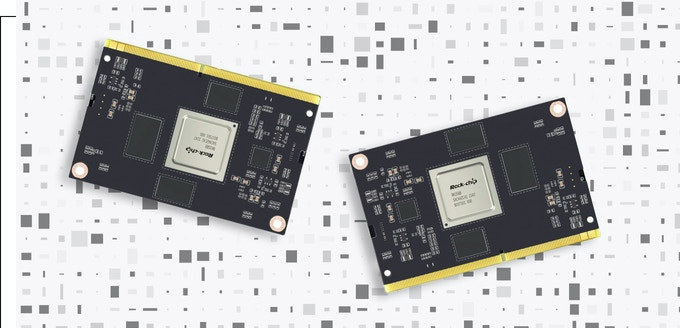We first covered the Turing Pi V2 mini-ITX cluster board supporting up to four Raspberry Pi CM4 or NVIDIA Jetson SO-DIMM system-on-module in August 2021. The company has now launched the Turing Pi 2 on Kickstarter with a little surprise: the Turing RK1 module with Rockchip RK3588 Cortex-A76/A55 processor and up to 32GB RAM.
The board allows you to mix and match modules (e.g. 3x RPi CM4 + 1x Jetson module as on the photo below), and with SATA ports, Gigabit Ethernet networking, USB 3.0 ports, mPCIe socket, you could build a fairly powerful homelab, learn Kubernetes, or self-host your own apps.
Turing Pi 2 specifications:
- SoM interface – 4x 260-pin SO-DIMM slots for up to four
- Raspberry Pi CM4 with Broadcom quad-core Cortex-A72 processor, up to 8GB RAM, up to 32GB eMMC flash (adapter needed)
- NVIDIA Jetson Nano/TX2 NX/Xavier NX SO-DIMM system-on-modules with up to 6x Armv8 cores, and 16GB RAM.
- Turing RK1 with Rockchip RK3588 octa-core Cortex-A76/A55 processor, up to 32GB RAM, eMMC flash
- Storage – 2x SATA III ports via a PCIe controller connected to one module
- Video Output – 1x HDMI port, 1x MIPI DSI header
- Audio – Digital audio via HDMI
- Network connectivity
- 2x Gigabit Ethernet RJ45 ports
- 1 Gbps 7-port L2 managed switch with IEEE802.1Q VLAN for the two RJ45 ports, four Gigabit Ethernet interfaces between the modules, and 100Mbps for the BMC
- USB – 2x USB 3.0 Type-A ports, 2x USB 3.0 via header
- Expansion
- 2x mPCIe sockets, each connected to a specific module, including one with a SIM card socket
- I2C header for cluster management
- 40-pin GPIO header
- Misc – RTC + coincell battery holder, system fan connector, front panel header, Board Management Controller (BMC) with remote access
- Power Supply – 24-pin ATX header
- Power Consumption – Less than 60W with four NVIDIA modules
- Dimensions – 170 x 170 mm (Mini-ITX form factor)

Some more details about the upcoming Turing RK1 module:
- SoC – Rockchip RK3588 octa-core processor with 4x Arm Cortex-A76 @ 2.4 GHz, 4x Arm Cortex-A55 @ 1.8 GHz, Arm Mali-G610 MP4 GPU, 6 TOPS NPU, 8K 10-bit video decoder, 8K video encoder
- System Memory – Up to 32GB LPDDR4x/LPDDR5
- Storage – TBD eMMC 5.1 flash
- PCIe Gen 3.0
If we don’t have the full specifications yet, that’s because the module is not quite ready.
The company will provide an open-source firmware for the BMC to ease remote board management through a command-line interface. Turing Pi 2 can be used as a learning platform for tools such as Kubernetes, Prometheus, Docker, and Serverless, a self-hosted home lab with various web services such as Home Assistant, media streaming services, gaming servers, office packages, messengers, etc…, as well as for data science when connecting one or more Jetson module with AI accelerators.
Turing Pi 2 mini-ITX cluster board has just launched on Kickstarter and has raised over one million dollars in less than a day. The early bird rewards ($199) are all gone, but you can still pledge $219 to get the board. That’s without any system-on-modules and accessories. The company explains that you will receive a link to a survey where you can select the compute modules and accessories you need in order to secure all the supplies with vendors. The shipping fee is also to-be-determined but estimated from $15 (USA) up to $70 depending on the destination country.

Jean-Luc started CNX Software in 2010 as a part-time endeavor, before quitting his job as a software engineering manager, and starting to write daily news, and reviews full time later in 2011.
Support CNX Software! Donate via cryptocurrencies, become a Patron on Patreon, or purchase goods on Amazon or Aliexpress






> Turing TK1 module… 4x Arm Cortex-A76 @ 2.4 GHz
Maybe they should better advertise this as ‘up to 2.4 GHz’ since just as with RK3568 clock generation seems unstable for yet unknown reasons. Two recent Rock 5A (RK3588s) sbc-bench results indicate that generated clocks are unstable as well with RK3588/RK3588s.
So far no A76 on RK3588(s) has been confirmed to reach the advertised 2.4 GHz (with the opp-2400000000 node active and cpufreq driver talking about 2400 MHz ofc).
I thought my expectations had hit rock bottom already…
Well, clocking the A76 cores not with 2.4 but only 2.3 GHz results in less than 5% CPU performance difference (single-threaded). Funnily the A55 cores are affected as well.
Anyway, even with these unstable clocks RK3588(s) easily outperforms A311D2 (multi-threaded ~33% faster, single-threaded ~50%) and everything Jasper Lake…
Your lists are useful but I suggest the maxim still holds, decide the software you need first, then the hardware that runs it best and reliable.
Fairly fast at beancounting yea… 4 extra cores also really helps with the multi-threaded benchmarks . The Aes256 is fairly impressive though.
Those Jasper Lake scores are also with passive cooling (though shouldn’t matter) and a single ram slot* (which does matter)
Real word day to day use is also different from a few benchmarks due to the difference in software support (which you know everything about).
On a sidenote the GPU of the 3588 has a lot more rawpower than the UHD ones in Jasper Lake SoCs… but I obviously trust Intel’s driver a lot more. And their feature set has always been good, even with subpar raw performance.
*Though the 5105 is with dual channel I think..
You mean Rock 5B?
Do you see Rock 5B here: https://github.com/ThomasKaiser/sbc-bench/blob/master/Results.md ?
I’m talking about Rock 5A (‘credit card’ size / RK3588S). And RK3588S is what I expect on such a ‘Turing RK1 module’ since why would they choose the more expensive RK3588 just to ignore all the additional I/O anyway?
All the rk3588(except radxa) claimed 32G ram support but no one see it.
It can become interesting if they start to support boards featuring high performance cores. Cooling might become an issue sooner or later though. The price it not cheap for just a base board, but I imagine it can shrink with production volume.
Too bad they stuck to GbE now that 2.5G has reached the consumer market and is very common among switches. t could definitely make a difference.
> Cooling might become an issue sooner or later though
It is already an issue. Just look at the picture above with 3 x CM4 and 1 x NVIDIA Jetson. The latter with a reasonable sized passive heatsink fits only into the outer slot since the spacing of the slots is too narrow for reasonable passive heat dissipation.
Then thinking of the A76 on RK3588s: they hit 85°C with a single A76 being busy and throttle down from 2300 to 408 MHz without any cooling applied: http://ix.io/3XTA
Same benchmark on same Rock 5A now with appropriate cooling: http://ix.io/3XYo -> the A76 remain at ~2.3 GHz, the A55 at ~1.8 GHz.
So good luck with their ‘Turing RK1 module’ which is even smaller than Rock 5A. Most probably w/o annoying fan(s) and efficient low profile heatsinks (graphene?) no way to benefit from RK3588’s potential CPU performance.
It could possibly be achieved using some complex assembly of a 90° metal pad and a big thermal plate at the top like I did in my build farm. Still not easy at all.
The video linked in the article does not play for me. But the YouTube videos on the kick starter page do. The reviews use slim black heatsinks on the Pi boards.
I tried Samsung and Brave browser.
They can fit 4 NVIDIA jetson boards with heatsink so it should be fine to cool it with fan
I would love to see it filled with new nvidia jetson orin 🙂